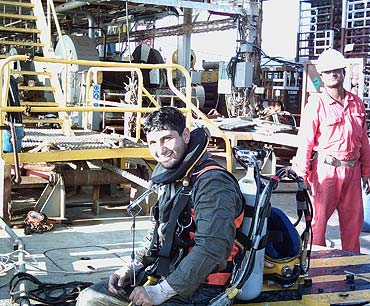
Abhishek Mande speaks to 29-year-old diver Fredoon Kapadia about what it takes to be in the profession.
Fredoon Kapadia has been a commercial diver for the last nine years. He has just returned from a two-month assignment in Saudi Arabia and is enjoying being on land.
He doesn't make any bones about telling you that he makes good money, but that was not always the case.
"Money wasn't very good in the initial years but today I make in two days what some of my friends would in a month," he tells you.
Yet when he first started his offshore career, he was as clueless as an average teenager about what he wanted to do. "All I knew was that the money was good eventually!" he says.
Nearly a decade later though, his love for tools and equipment combined with his science education and an intense passion for his job have held him in good stead.
As a SAT (short for 'Saturation') diver, Kapadia works for a company that bids for contracts from oil companies for cleaning, maintaining, inspecting and repairing underwater pipelines and platforms and structures.
"Basically we are sub-sea construction labourers, nothing more," he says matter-of-factly. But working anywhere between 100 to 500 feet under water means that Kapadia puts his life on the line just so that the structures under water are shipshape.
Add to that the loneliness in the underwater chamber that houses anywhere between four and six divers and little else. He tells you that while you are technically connected with the rest of the world -- companies often provide you with Internet facilities and you can buy phone cards -- you do crave to be back with your loved ones.
Kapadia says that everyone is dying to get back. "Some tell you that this will be their last job but they are back a month or two later! The job itself can be quite mechanical but the money is great. I've known people as old as 60 who are still working. Most of them are in it because it pays well. Very few are in it for the love of the job. We call those people crazy!" he laughs.
Fredoon Kapadia talks about the job of a SAT diver and why it might not be for everyone...
Click NEXT to read on...
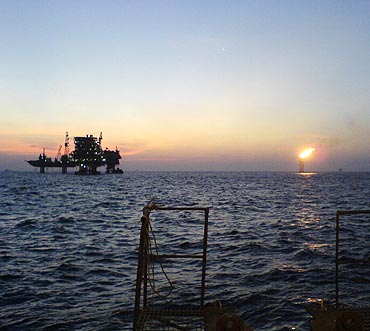
I was never into academics and would scrape past in exams, but I was good with tools and mechanical equipment. I could take my motorbike apart and put it back together myself.
Then I heard about a neighbour who worked off shore and had made enough money to eke out a more than comfortable existence. Curious to find out more about his job, I visited him. The neighbour was a commercial diver.
Fascinated by it, I decided that was what I wanted to do. So after Class 12, I took up an air diving course at 19 and began working at 20.
SAT (short for Saturation) diving is a technique that allows divers to stay under water at great depths for hours and work there without getting decompression sickness.
What is decompression sickness?
A disorder, seen especially in deep-sea divers, caused by the formation of nitrogen bubbles in the blood and tissues following a sudden drop in the surrounding pressure, as when ascending rapidly from a dive, and characterised by severe pain in the joints and chest, skin irritation, cramps and even paralysis.
What does a SAT diver do?
If you are a SAT diver your employer will in all probability be an oil company and you will be doing jobs like installation of offshore platforms, laying pipelines, exploring, drilling and underwater welding.
A SAT diver is also responsible for cleaning, maintaining, inspecting and repairing underwater pipelines and platforms and structures. Basically you are sub-sea construction labourer.
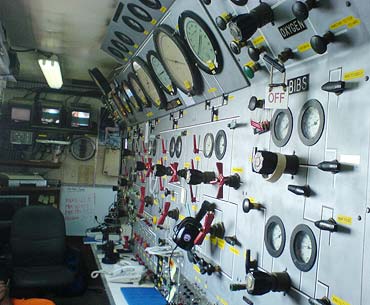
You simply need to be an IMCA-recognised (International Marine Contractors Association) commercial diver. You needn't be a graduate or have any specific education degree, although a background in science does come handy.
What you do need though is a course in air diving and then a course in SAT diving. Each of these courses lasts for a few weeks and cost around Rs 8 lakh (Rs 800,000). Now, I believe, it has gone up by another Rs 4 lakh (Rs 400,000).
An air diver basically does any work that is not deeper than 50 metres under water. More often than not, air divers are afloat when they work unlike SAT divers who have the liberty to walk on the seabed.
On the flipside, the job of an air diver does not last for very long but that of a SAT diver can go on for hours.
I completed my air diving course from The Underwater Centre in Fort William in Scotland, worked as an air diver for four years before going in for a course in SAT diving and becoming a SAT diver.
During my time, it was the only school offering an IMCA-recognised course. Now there are a few more that have come up.
There are a number of schools that provide commercial diving (http://tinyurl.com/sat-diving-schools) but they must be IMCA-recognised if you want to work with the bigger companies.
What kind of pay can you expect?
When you start off as an air diver you earn anywhere between $100 to $300 (about Rs 4,600 to Rs 14,000) a day.
You earn between $300 and $600 (about Rs 14,000 to Rs 28,000) per day as a SAT diver. Over and above that you make $20 to $40 (Rs 900 to Rs 1,800) per hour for the time you are in the chamber itself.
You work in teams of two and tend to work anywhere between 8 and 12 hours each day without a day off. Part of the day you spend in water and the other part in the diver's bell monitoring your partner who gets into the water after your part of the job is done.
What are the risks involved?
A SAT diver is usually about 100 to 500 feet under the sea -- often walking on the seabed. You are working under or on the oil rigs. That is a lethal combination you are looking at. Pretty much anything can go wrong here.
It is a high-risk job. That's why they pay you so much.
Can women apply?
Yes. There have been women SAT divers but not many stay for long. The work is purely physical and there is absolutely no privacy. Not many can handle it.
There are cameras everywhere including in the bathroom -- simply because an emergency can strike anywhere, anytime. What if you just faint in the bathroom?
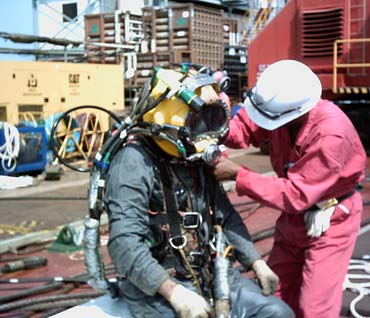
You have to stay away from your family for months on end.
When working as a SAT diver you may spend up to 28 days in a chamber that is possibly as large as an Indian Railways coupe.
Besides the five to six people who are with you, you have no contact with anyone.
It's like being given whatever you want -- food, Internet, entertainment -- but being confined to your bathroom for those 28 days.
The challenge about being a SAT diver is not so much the job itself but surviving that isolation day after day.
Early on I was offshore for almost five months -- 143 days to be precise -- but it is not something I would do now. I was young then and wanted to do it at least once.
But now I look forward to coming back home to my fiance and my parents. Usually I take up jobs that don't require me to be away from home for more than two months at a time. But even those few weeks can be excruciatingly long.
You are living in a chamber that is not larger than maybe 100 sq feet with absolutely no privacy and at times going weeks on end without so much seeing a glimpse of the sun.
Your day involves working in the water for about four hours then replacing your partner in the diving bell and ensuring he is fine.
You go to bed, wake up and start all over again.
What is the upside?
Well, the money is great!
Also if you are out of the country for six months in a year, your income in India isn't taxed. You get to see some really great sea life and make some really good friends from all over the world.
What keeps you going in the job?
You should be passionate about what you do. It might just be fixing nuts and bolts but it is one very important job.
It needs to be precise and you need to be focussed on what you do otherwise things can get out of hand.
One small mistake on your part can cost someone's life.
I've always been interested in the workings of a machine. I guess that keeps me going.
Money shouldn't be the only driving force; it can't be actually, definitely not when it is such a high-risk profession.
This is a small industry and a small mistake can ruin your reputation.
Should you be afraid of sharks?
No! In fact there is not a single recorded incident in the history of a SAT diver being attacked by a shark. Most of these creatures are docile and uninterested in what you are doing.
Except snakes, who are very curious by nature and often look at you directly in the face because the light on your head attracts them.
Have you ever been in a life-threatening situation?
It happened at Mumbai High (the offshore oilfield off Mumbai) during the monsoon. I was on the deck and a rough wave almost got me killed.
I had to be airlifted and was in bed for two weeks. Thankfully it was just a muscle pull.
Since then I've stopped taking assignments at Mumbai High during the monsoon, when the sea is rough.
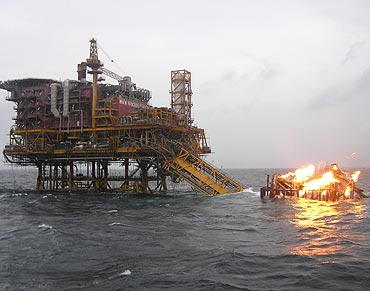
1. You need to be very fit. This is pure labour and if you aren't physically fit you better not be here.
2. Be ready to get your hands dirty -- oil and grime is all part of the job. This is a blue-collar profession in a certain sense.
3. You must have common sense. Scientific formulae won't keep you alive -- it's your head on your shoulders that will.
4. You must know swimming -- I think that's a given.
5. Most importantly you must have mental stamina. You are in a place that is uninhabitable to humans and are restricted to a small room where there is no privacy or sense of personal space.
Only your mental strength can keep you going.
What would you advise young people wanting to take up this job?
Talk to someone who has been in this profession. Understand what it entails and find out if there is a job opening.
During the recession some of my juniors were sitting idle with no jobs. When your course fees are as high as Rs 12 lakh (Rs 1.2 million), it can mean a lot of stress.
On the job, you must have the drive to go the extra mile. You will always have people who will take up from where you left off, but that doesn't mean you shouldn't achieve the goal set for you.
Share a laugh on the job.
Take it easy.
Make friends -- you will be with them for at least two months.
Take your job seriously and don't let money be the driving force.
There is no scope for error. You might have had ten glory dives and a bad one.
You will always be remembered for that bad job.
You are only as good as your last dive.